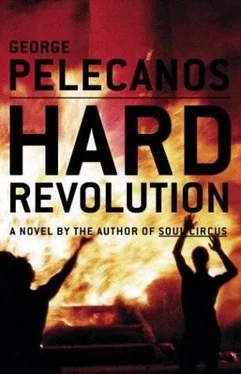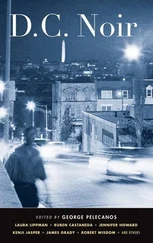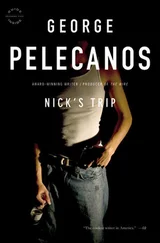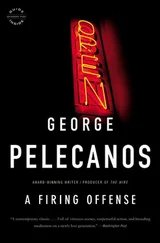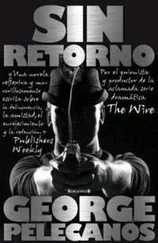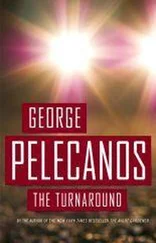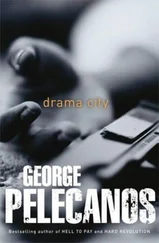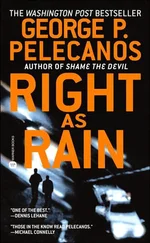Dennis Strange came back to D.C. as a cripple living off the government tit, more bitter and insecure than he had ever been before. He moved in with his parents and did not try to get a job. He got high every day. He went to seminars at Africa House, a couple of SNCC and Black Nationalist rallies, and attended a few meetings organized by the local chapter of the Black Panthers in Shaw. He thought he would be into the Panthers, but he was put off by them, too. True, many in attendance were genuinely committed. But a few of the young brothers were there because they liked the fit of the beret and the cut of the uniform. Others were there for the pussy to be had. Some of them liked to shout; all of them liked to talk. To Dennis, they were dark-skinned versions of those kids with the long hair who hung out at Dupont Circle, on the other side of town. They were playing soldier, but they didn’t really want to go to war. As usual, he did not fit in.
He tried to follow Dr. King but felt the reverend was too forgiving. Time was gone for joining hands. King’s followers believed freedom could be got with pacifism and words of love. Dennis knew that America would only respond, really respond, to the sound of gunfire, the sight of blood, and the smell of ashes.
“Goddamn right,” said Dennis, the reefer, along with the pill he had taken, hitting him all at once.
“Say what?” said Kenneth Willis.
“Nothin’.”
“You talkin’ to yourself again.”
“Yeah, I know,” said Dennis. “Must be ’cause I’m high.”
Willis parked the Monterey on a residential block of LeDroit Park, southeast of Howard University, in front of a row house converted into three units.
“This your cousin’s new crib?” said Dennis.
“His woman’s,” said Willis. “She got a baby in there, too.”
“From his blood?”
“He’s made a couple his own self. But this one’s not his.”
Dennis Strange looked at the steps going up a hill to the house. There’d probably be at least another flight he’d have to take once inside. All those stairs were hell on his back.
“You can run the shit in to him,” said Dennis. “I’ll stay in the car.”
“You need to come with me,” said Willis.
“Why?”
“Alvin says he’s got a proposition for us. Wants you in on it, too.”
DOMINIC MARTINI CAME up off Longfellow and turned left, taking Georgia Avenue north toward Silver Spring. His wrist rested on the wheel of his Nova, and a freshly lit Marlboro hung between his lips. Jack Alix, the DJ on WPGC, sprang boisterous from the radio as he introduced a song.
“Here’s Gary Puckett and the Union Gap, with ‘Woman, Woman,’ comin’ in at number one!”
The singer started out sincerely, then went dramatic on the chorus, demanding to know if his girl was thinking of stepping out on him. The music swelled around Martini in the car, but it barely registered. His attention was focused on the street.
When he’d gotten back from the service, the first thing he noticed about Georgia Avenue was that it had been repaved. The white concrete and streetcar tracks were gone, replaced by black asphalt. The platforms and watering troughs had disappeared. Everything looked less bright.
The second thing he’d noticed was that there were many more blacks in the neighborhood, up on the commercial strip and in the residential areas as well. Soul music came from radios of cars cruising the Avenue and sometimes it came from the open doors of the bars. Realtors had brought in black buyers and turned white blocks gray, causing many white homeowners to sell their houses on the cheap and move into the Maryland suburbs. Martini’s house on Longfellow looked the same as when he left it, but most of the neighbors he’d known in his youth were gone. He felt like a stranger in his hometown.
There were changes inside his house, too. His father had died of liver failure. Angelo was gone. His mother was in a state of perpetual mourning and always wore black. The smell of the pasta sauce simmering in the kitchen reminded Martini he was home. But it was a lifeless place now. Windows were kept closed. The air was still, and the furniture held a thin coat of dust. He often heard his mother sobbing at night in her room.
He had few friends. He had not finished high school and felt cut off from those who did. Some of the kids he’d come up with were away at college, and he seemed dead to those who remained. He had not expected to return to D.C. with a hero’s welcome. But he had hoped for respect.
He got it from the old-timers, especially the veterans, but it was different with the young. To many of them, he was a freak. In bars, he no longer talked about Vietnam. It didn’t help him with women and sometimes it spurred unwelcome comments from men. When he mentioned his tour of duty, it seemed to lead to no good.
Now he was twenty-five years old, back at the gas station, working the pumps and washing windshields, doing the same thing he’d been doing when he was sixteen. His service benefits would pay for college, but he’d have to tackle high school first. He supposed that he could get that degree if he worked at it, but he knew he wasn’t smart enough or ambitious enough to take the next step.
He hung with Buzz Stewart. Stewart rode him sometimes, but he was the closest thing to a friend Martini had. And there was something else about Buzz, something that was difficult for him to admit. Martini had gotten used to taking orders. He had grown comfortable getting up in the morning and having someone tell him what to do. When Dominic Martini looked at Stewart’s sleeves, he saw stripes.
Stewart had asked if he was in. To Martini, it had sounded like a command.
Martini went under the railroad bridge in downtown Silver Spring. He passed Fay and Andy’s, a beer garden at Selim where he sometimes drank with Buzz and Walter Hess, and hung a right at the Gifford’s ice cream parlor on the next corner. He drove down Sligo Avenue, toward Stewart’s place on Mississippi. He took a final drag off his cigarette and pitched the butt out the window.
Stewart was okay as long as he was sober. Hess was wrong most all the time. Both of them were ugly when they tied it on. Martini listened to their hate talk but didn’t join in. They were all together on some things but not on that. Martini had been that way himself most of his life, but now he was not. While growing up, he had listened to his father talk constantly about niggers, mostly while drunk, and it had infected him. It took a tour of Vietnam to clean the poison from his blood.
It was clear from the start that the men of his platoon were more alike than they ever would have imagined. None of them came from money. None fully understood the circumstances that had brought them to Southeast Asia and put them in the line of fire. All watched one another’s backs. In those ways, and in many other ways, they were brothers.
He had forged deep friendships with blacks and whites. He had thought the bonds would last. But after his discharge he lost contact with them. He was embarrassed to write them letters, as he couldn’t spell for shit. And anyway, what would he say? My life is fucked. I’m pumping gas and getting ready to do a robbery. What’s up with you?
Back in D.C., he was disappointed to find that the old mistrust remained. If anything, the canyon between blacks and whites was wider than it had been before. He tried to make friendly with some black guys who were new to the neighborhood but got limp handshakes and ice-cool eyes in return. Stewart and Hess laughed about this, called him Martini Luther King, Lady Bird, shit like that. They told him that a guy needed to choose which side of the line he was gonna stand on. That even the niggers didn’t respect a man who switched sides. But he had lost the heart for that sort of conflict. He didn’t hate blacks. He didn’t want to hate anyone anymore.
Читать дальше
